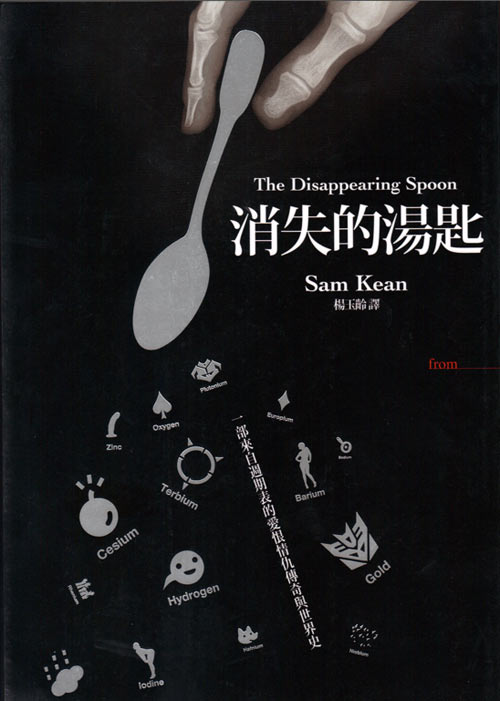Where Did All Those Naked Ladies Come From?
How the Chinese edition of my book about the periodic table got such a risqué cover.
Posted Wednesday, Aug. 17, 2011, at 10:03 AM ET
Still, all this national variety didn't prepare me for a Chinese edition of Spoon from Taiwan. From an overstuffed envelope I pulled out a book with a sleek, silver-and-black cover. Quite striking. And appropriately, an X-rayed hand was grasping a metallic spoon near the top. But just below that, spilling down from the spoon, there appeared a scattering of incongruous icons. There was a spade labeled "oxygen"; a diamond labeled "europium"; a fried egg and frying pan labeled "sodium"; and a raincloud raining upside-down labeled "carbon." None of these motifs appear in my book, and these icons didn't seem to fit the elements they're paired with.I've been lucky enough to have my book published in a few countries now, and despite the universal subject matter—the periodic table—each country has had a different take on it. Some publishers merely tweaked the book: The British, for instance, re-imagined the cover. More drastically, the Germans changed both the cover and the title, from The Disappearing Spoon— a title derived from a classic nerdy science prank—to Die Ordnung der Dinge, which translates, I'm told, to the weightier, "the order of things." I'm also excited to see upcoming editions from Iceland and Korea—even if there is something strange about thumbing through pages of words I know I wrote and not having any idea what they say.
I also hadn't written about toys or movies, so I couldn't make sense of what looked like Transformers logos for "gold" and "plutonium." But most baffling were the smutty icons: a smiling anime sperm ("hydrogen"), two naked women thrust into suggestive poses ("barium" and "iodine"), and a slightly drooping dildo named "zinc." (Why not silicon?) The envelope also contained a note from my American publisher: "Who knew iodine was so sexy?"
Who indeed. I'd filled the book with tales about the elements that were spooky, funny, touching, macabre—but I never thought of myself as writing something a teenage boy might stash beneath his mattress. (The iodine story in The Disappearing Spoon talked about those noted hunks Gandhi and Bertrand Russell.) Was this a gross mistranslation? Dadaist whimsy?
To get to the bottom of the mystery, I emailed a friend who has lived in China for years. She was equally nonplussed. Next I tracked down the publisher's website. Thinking myself hot on the trail, I found that they'd recently published The Joy of Orgasm and The Pickup Artist: The New and Improved Art of Seduction. So maybe this was a risqué operation all around. But both of those books had inexplicably tame covers.

I finally got in touch with the jacket designer for the translation, Bianco Tsai. (Aside from tidying up some informal email punctuation for print, all quotes that follow are sic. English is not Tsai's first language. I hasten to add, though, that her English is approximately infinity times better than my Chinese.). It turns out that her inspiration for the cover actually paralleled my own motivation in writing the book: "We usually have many technology books, [which] are serious, serious, serious, and bored!!" she wrote via email. "So, this one, we want to make it more fun and interesting, to catch people's eyes, and make them curious about it."
She succeeded there. The one element emblem of hers I'd grasped immediately was the cartoon bomb with a lit fuse, for cesium, since cesium can be explosively reactive. Tsai confirmed my guess: "Cesium is dangerous, so I use a bomb." As for oxygen, she offered, "Oxygen is really important, we can't live without it. So I use 'ace spade,'" the ace of spades being a trump in various card games. Even the zinc schlong started to make sense, sort of: "When a men was weak in sex, his wife might give him some seafood, [and] the seafood have many zinc. That is why I draw that icon for zinc."
In the end, Tsai said, "I have to built a bridge to connect our culture to your book!" I still think her cover looks sharp, and if Tsai says that it bridges my book to Chinese culture, I believe her. If so, though, it's a one-way bridge. Trying to decipher the cover still leads to an uncanny feeling for me. Something I'd labored over for years, and written and rewritten until I'd practically memorized it, had became alien. It's what those poor characters in neurologist Oliver Sacks' books must feel like when they suddenly have a stroke or something and can't recognize their own faces in the mirror. It was yet another reminder that although the periodic table is universal, people's reactions to it are anything but.
Labels: ace spade oxygen, anime sperm hydrogen, bridge to chinese culture, dadaist whimsy, europium diamond, fried egg pan sodium, naked women barium iodine, sam kean disappearing spoon slate, zinc dildo fish
